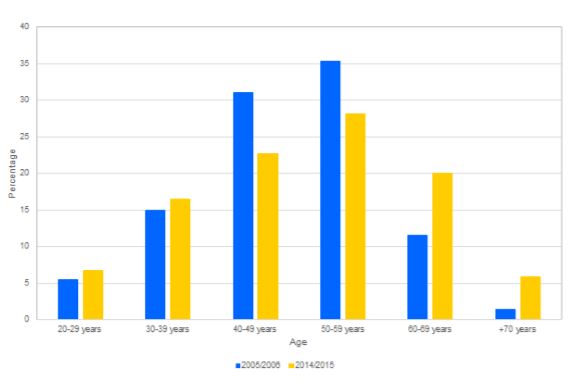Topic
How to manage exit from the profession?
In some jurisdictions demographics point to a rapidly ageing profession with concomitant problems of inability or unwillingness to leave practice, the onset of dementia etc.
With ever increasing life expectancy and a desire to stay active in the legal profession longer, lawyers are continuing their careers into a time in their lives where previously many would have retired.
The legal profession is fortunate to have these experienced and valued lawyers continuing to serve their clients. However problems can arise when lawyers can no longer maintain competency levels due to health issues that disproportionately affect older people. If the lawyer is in a larger firm this is often dealt with by the firm and there is no impact on clients, however where the aging lawyer runs their own small firm, especially where they have minimal support, problems can arise.
Older lawyers can be unwilling to retire and leave behind a career that forms a large part of their identity. It may be that their life’s work will not attract much resale value, or they may wish to remain registered to practice so they can still do some work for family and friends, while still being able to lay claim to the title. They may simply need to continue receiving an income. These factors can apply to sole practitioner solicitors and barristers alike.
While to the regulator and professional association it may seem that aging lawyers need more support, sometimes the lawyer takes a different view, feeling that are very experienced and do not need help, continuing professional development/legal education, or any guidance or training with how to improve the way they run their business and manage their trust account. Taking the view that they have nothing to learn or gain can impact on the way they interact with the regulator and their professional society, as well as the way they service clients, given changes to the law and expectations.
Older lawyers can also suffer when personal and staffing issues eat into their time, such that they have a decreased ability to service their business and clients. Lack of uptake of modern technology and processes can particularly be felt when health or other issues arise. Examples seen in Victoria, Australia include cases:
- Where a principal of his own practice had his associate of 20 years retire which saw him have to take on more work, and he become less organised. He acknowledged that the additional pressures together with his age meant he could not continue to practise in the manner he wanted to, so he stepped back to a part time role.
- Where an older experienced lawyer charged excessively for the time spent perusing documents, in addition to failing to provide a costs agreement and failing to comply with ongoing disclosure obligations. A binding Costs Determination was made reducing the costs payable, and an education order made to ensure that the lawyer undertook a professional development course with a focus on appropriate billing and cost disclosure obligation. However the lawyer felt he did not need this.
- Where a complaint about delays, rudeness and inadequate costs disclosure in an estate matter led to the lawyer complained of revealing that he had been caring for his dying mother who had recently passed away. It also became apparent that his junior lawyer had left temporarily on maternity leave. The lawyer had struggled to cope with the demands of maintaining his own work whilst balancing other factors that had affected his
practice and personal life, and he fell behind on certain tasks with important deadlines, and became curt in responses to his client.
The Victorian Legal Services Board + Commissioner has been working on a project with the University of Melbourne looking at ‘Harnessing the Power of Regulatory Data to Improve the Regulation of Lawyers’. Initial findings have identified that lawyers in the older age groups are at increased risk for experiencing complaints, as well as at increased risk for complaints that result in some disciplinary finding, compared to younger lawyers.
Reasons for this could be that older lawyers may develop habits and set ways of operating that are (or become) out of step with contemporary standards; they may also become less vigilant or over confident in their own skills and ability.
Research has revealed that in Victoria lawyers are continuing to work later in life, with one in 8 over the age of 60 today, compared to less than 1 in 10 in 2005. Results also suggest that older lawyers receive more complaints in wills and estates matters, and an increasing percentage of all complaints. Although the data suggests that a lawyer is more likely to attract a complaint in their 50’s, the likelihood remains high into the 60’s and beyond, as can be seen below.
Why is this, and what can we do about it?



